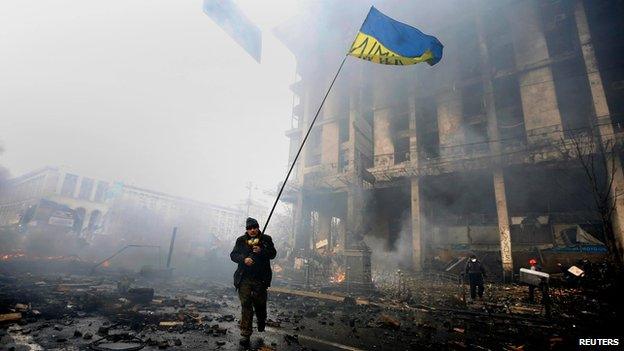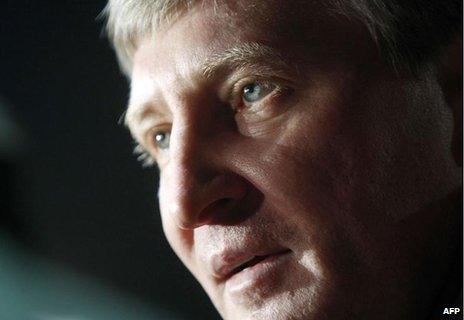Ukraine crisis: Oligarchs are Yanukovych's weakest link
- Published

The turmoil in Ukraine could threaten business interests and push the country's oligarchs to act
As Ukraine slides further toward catastrophe, its rich and mighty could play a key role to prevent further loss of life and put the country on the path to normalisation. Ukrainian oligarchs, who control great swathes of the country's economy and some 80-odd MPs from the ruling Party of Regions, could, counter-intuitively, become part of the solution.
In Ukraine the fusion of business and politics is more the rule than the exception. Holding high legislative and executive office provides access to a patronage system, protection for business, access to public finance, and immunity from prosecution.
For example, Ukraine's richest man, Rinat Akhmetov, the main financial backer of the regime and a long-standing ally of President Viktor Yanukovych, was, until recently, a member of parliament. These privileges can yield substantial benefits.
Forbes.ua (the Ukrainian edition of the Forbes financial magazine) reports that Mr Akhmetov's businesses obtained 31% of all state tenders in January 2014.
Mr Yanukovych's son tops even this, having "won" 50% of state contracts in the same period. Mr Akhmetov controls a group of around 50 MPs in parliament.

Oligarch Rinat Akhmetov has been critical of the violence but is sticking with the president, at least for now
Mr Akhmetov has issued two statements condemning the violence and went out in his hometown of Donetsk in eastern Ukraine to talk to protesters outside his house. Meanwhile in London, protesters regularly rally near his luxury apartment at One Hyde Park Corner, the most expensive real estate in the city, in protest over his support for the authoritarian regime.
But Mr Akhmetov, despite a shaky history with Mr Yanukovych, is currently sticking with the president.
Other powerful business moguls inside the Party of Regions include Vadim Novinsky, the third-richest man in Ukraine, and Serhiy Tigipko, a former presidential candidate and minister of labour. As the violence took a new vicious circle this week, Mr Tigipko called for a new technocratic government to manoeuvre Ukraine out of the edge of economic and political default, and for international mediation of the crisis.
Finally, the so-called "Firtash group" in the parliament is led by gas magnate Dmytro Firtash and Vice-Prime Minister Igor Boyko. It includes around 30 MPs.
A close ally of Mr Firtash, Serhiy Liovochkin, has resigned as Head of the Presidential Administration but remains an advisor to Mr Yanukovych. With the rising death toll this week, the gas magnate sent out a statement calling for peace, for the first time since the crisis.
Statements such as these are not enough to stop the bloodshed. Business groupings have hitherto shied away from taking responsibility and using their considerable influence in parliament to force a resolution.
Achilles' heel
This partly explains the escalation on the streets of Kiev this week, as parliament failed to vote in changes to the constitution.
Such a move would have limited the powers of the president and paved the way for elections. The protesters thus lost hope for a viable solution from the main legislative chamber.
The business clans are the Achilles' heels of the regime. With smart sanctions, targeting financial assets and judicious visa bans, including on members of the Yanukovych family, the West could help to break the status quo in Ukraine.
Big businesses need access to European markets. Further instability will devalue their assets.
Cutting off European oxygen would mean that the cost of doing business under a Yanukovych presidency would be too high. This is the main leverage that the EU and the US have.
If Mr Yanukovych fails to compromise, even under the pressure of sanctions, the business groups will still have a choice. But if they are hesitant, the EU and the US can help.
Under the pressure of sanctions, the business groups have enough members of parliament to form a new majority with the opposition and a smattering of independent MPs.
Fissures in the ruling Party of Regions have already started, with perhaps seven MPs leaving the faction and calling others to follow. If the oligarchs continue to hedge their bets, it will probably be their undoing - as the regime collapses with or without them.